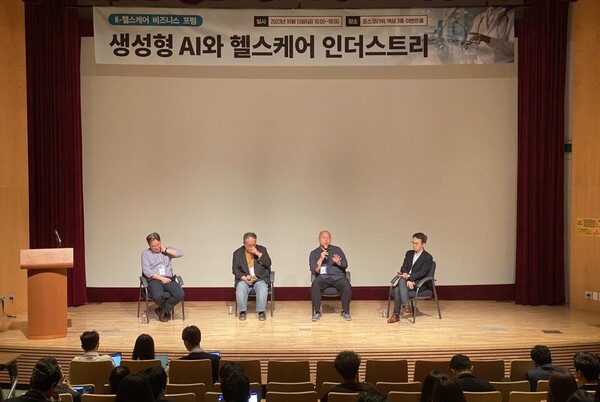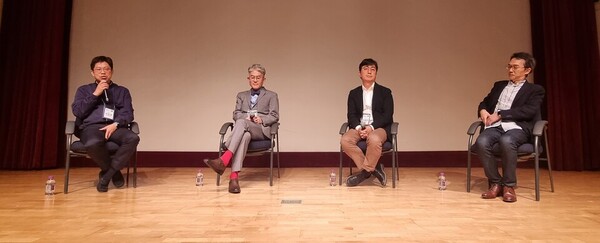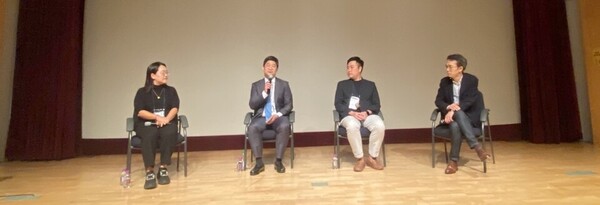Experts in the healthcare sector, ranging from professionals in companies to medical professors, came together in Seoul on Friday to exchange their expertise and envision the future of generative AI in healthcare.
Korea Biomedical Review (KBR), along with its sister publication, The Korean Doctors’ Weekly, and the Korea Healthcare Industry Promotion Agency (KHIDI), co-hosted the K-Healthcare Business Forum. The event was centered around the theme of "Generative AI and the Healthcare Industry" and took place at POSCO Tower Yeoksam in southern Seoul on Friday.
During the initial two sessions of the forum, prominent AI companies in Korea -- Kakao and LG -- shared their insights and forecasts concerning the future of AI within the healthcare and pharmaceutical industries.
In the third session, Professor Ko Tae-hoon from the Medical Informatics Department at the Catholic University of Korea College of Medicine and Professor Shin Jae-yong from the Preventive Medicine Department at Yonsei University College of Medicine provided their perspectives on the future of AI-related medical institutions and faculty entrepreneurship.

Kakao taps chest X-ray draft reading, diabetes management
Kakao Brain and Kakao Healthcare presented their ongoing projects, which encompass AI-supported computer-aided diagnosis (CAD) and services related to diabetes. They also discussed the challenges and proposed solutions for harnessing AI effectively within the healthcare sector.
Zeron Bae, Chief Healthcare Officer and Vice President of Kakao Brain, elaborated on the company's extensive medical AI endeavors. Bae emphasized that generative AI holds the potential to deliver remarkable outcomes in the realm of medical image diagnosis and interpretation.
Particularly noteworthy, generative AI distinguishes itself from conventional AI by its ability to self-learn using solely X-ray images from medical facilities and textual readings generated by medical professionals, he said.
Bae underscored that this technology continually evolves, positioning it as a pivotal direction for the future development of AI.
However, he acknowledged that obtaining a diverse and high-quality dataset in the medical field is a challenging task. He drew a parallel by comparing the situation to having a large capacity bowl but facing inefficiency due to a scarcity of clean water to fill it.
Concerning the development of chest X-ray (CXR) draft reading, a current project at Kakao Brain, Bae expressed that it has the potential to compete with global AI firms and make a significant mark in this domain.
"AI-driven CXR draft reading is not meant to identify what doctors might overlook, but rather to handle the less complex image interpretations, thereby allowing doctors to dedicate more time to analyzing the more intricate cases," Bae said.
Hwang Hee, CEO of Kakao Healthcare, provided insights into the present state of the company's comprehensive operations and offered predictions on how AI is poised to transform the healthcare industry.
Hwang emphasized that with the growing utilization of glucose monitoring services, the key focus is on ensuring the technology becomes increasingly “seamless and inconspicuous” for users.
He also underscored that diabetes-related services offer valuable assistance to patients. Still, he emphasized that when various data, including insulin usage, dietary habits, and physical activity, are shared with medical institutions during periods when patients are not physically present, it has the potential to fundamentally shift the treatment approach.
Hwang also mentioned the importance of securing health data. He noted that if obtaining data from medical institutions proves challenging, it becomes crucial to think about building an internal data analysis system within these institutions. This approach enables the processing of medical-related data internally rather than relying on external sources.
In this regard, he said that Kakao Healthcare is already collaborating with several medical institutions and is achieving results.
Kim Kwang-joon, a professor of geriatrics at Severance Hospital and a participant in the discussion following the presentation, emphasized that the development of medical AI necessitates the involvement of numerous experts who are genuinely interested in this field.
"In order to combine healthcare and AI, you need to understand medical information and AI information, and it's very difficult. I've seen a lot of situations where people don't understand it and it causes confusion," Kim said.

How is AI changing the pharmaceutical industry?
LG shared its perspective on the future of the pharmaceutical industry in relation to AI.
Clayton Park, the Director of AI Strategy in Life Science at LG AI Research, acknowledged the challenge of dealing with the rapid proliferation of similar AI models across different locations within a short span of just a month or two during the course of AI research.
Due to this challenge, he stressed the importance of developing a model that is tailored to address specific needs in areas where AI can make a meaningful impact, rather than simply presenting a generic "one-size-fits-all" AI model.
LG's AI Research is focusing on life sciences rather than healthcare, targeting overseas markets rather than domestic ones, and creating a knowledge transfer platform by collecting data, according to Park.
Drawing upon the example of drug development within pharmaceutical companies, he explained that the approach involves integrating public data with the internal data of pharmaceutical firms. This integration allows them not only to identify substances that are similar to a specified substance but also to document the results in the form of protocols, he said.
"We are collaborating with research institutes affiliated with global pharmaceutical companies in Europe and the U.S., as well as with medical institutions abroad. Also, we are exploring potential partnerships with domestic medical institutions starting from next year," Park stated.
Professor Howard Lee, from the Department of Clinical Pharmacology at Seoul National University Hospital, discussed the topic of "AI-based drug development, hype or reality." He acknowledged that drug development through generative AI is feasible, but he also pointed out the numerous hurdles that need to be addressed to bring this approach into the industrial realm.
Lee explained that AI is a viable tool for the development of new drugs because it excels at assimilating vast quantities of diverse data, processing them with remarkable speed, and acquiring knowledge autonomously.
He also highlighted the advantage of AI's capability to uncover hidden insights that might remain invisible in smaller models but become apparent when working with large datasets.
However, he noted that, in AI-backed drug development, people are using 19th-century methods with 20th-century technology in the 21st century.
In particular, he specified that areas such as optimizing the design of clinical trials, refining the selection criteria for clinical trial participants, choosing suitable clinical trial sites, integrating and analyzing diverse data from clinical trials, and incorporating digital pathology and imaging have not yet reached a stage where AI applications are fully feasible.
To solve these problems, people should integrate AI into the existing drug research and development framework, provide training to relevant personnel, and establish a robust pipeline engineering system to facilitate the seamless integration and flow of complex data, he said.
In the discussion following Lee’s presentation, Shin Seung-woo, team manager of AI Drug Discovery Team at Daewoong Pharmaceutical, said, "It is no longer possible to develop new drugs without using AI."
He said not only global pharmaceutical companies but also domestic peers are creating AI teams.

Visions of AI-powered medical institutions and the reality of faculty startups
Professor Ko Tae-hoon at the Catholic University of Korea College of Medicine gave a presentation on “Challenges and Measures for Medical Institutions to Embrace AI and Digital Health.”
Medical institutions are not as financially secure as people think, and it is difficult to create a solution that encompasses all members, Ko said.
"To utilize AI in healthcare, we need to think about how to handle medical data bias, security/privacy issues, and maintenance.”
Shin Jae-yong Shin, an associate professor at Yonsei University College of Medicine's Preventive Medicine Department, spoke on faculty entrepreneurship. Shin is the CEO of EverTri, which provides consulting and clinical trial design services for digital therapeutics approval.
"As a doctor, it is difficult to start a business (in the healthcare industry). If you must do it, you must have physical resources, family support, trustworthy people, and reliable sources such as finances and academic performance," Shin said.
Physicians are the group of professionals that should be most cautious, and they represent “clients rather than colleagues,” he said.
In the discussion session, Moon Yeo-jung, an obstetrician-gynecologist-turned managing director at IMM Investment, said, "From an investor's perspective, I haven't seen any healthcare startups in generative AI yet. There are cases where it is selected as a research field within large companies. As a whole industry, there are still not many startups related to generative AI."
Moon also emphasized the significance of closing the divide between companies and healthcare institutions in the context of sharing data.
"Companies are increasingly conscious of the necessity to compensate for the acquisition of medical data. However, there are instances where hospitals request royalties once they realize profits from data sharing," Moon pointed out.
"From a business perspective, this situation is analogous to a hospital receiving a barrel of rice, transforming it into alcohol, selling it in big cities like New York, and then seeking royalties from the resulting profits. Such a disparity exists," she remarked.
Related articles
- Lunit's ambition: from AI imaging to big data healthcare platform provider by 2025
- Medical IP scores FDA approval for AI-backed whole-body CT analysis software
- Korean AI medical imaging companies show impressive surge in share prices
- Neurophet’s AI-backed degenerative brain disease software scores FDA 510k
- KBR forum to explore the impact of generative AI on healthcare's future
- Kakao Healthcare, i-SENS to enhance diabetes care through CGM, digital health services
- Google Cloud, Kakao Healthcare leveraging federated learning to expand AI limits in healthcare
- Kakao Healthcare, Novo Nordisk team up to develop digital health for people with diabetes
- Kakao Healthcare set to ‘build a platform for clinical fields using data tech’
- Samsung, Kakao, Naver harness generative AI for medical advancements
- Kakao Healthcare partners with C&R Research to conduct global clinical trials
- Kakao Brain, Ajou University Medical Center to co-develop mega-scale AI medical imaging solution
- ‘Medical AI mishaps require manufacturers to share responsibility’
- Generative AI, top investment priority for 62% of healthcare CEOs: KHIDI report

